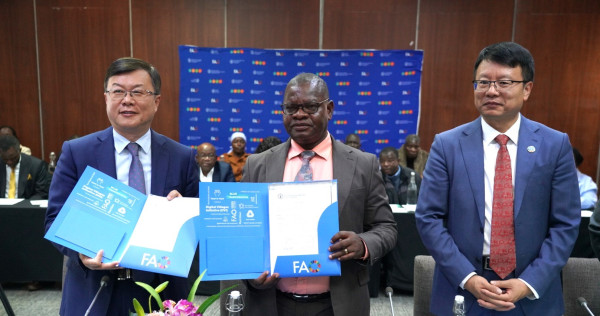Zimbabwe: Food and Agriculture Organization (FAO) launches two new projects on sustainable soil management and water governance in the Global South

Two transformative initiatives were officially launched in Zimbabwe, aimed at empowering the country to sustainably manage its soil and water resources. The two projects are entitled: “Capacity Development on Sustainable Soil Management in the Global South” and “National Water Roadmap towards 2030 Sustainable Development Goals.”
These two projects focusing on sustainable soil management and water governance are designed to accelerate progress towards the Sustainable Development Goals (SDGs) through enhanced technical capacity, inclusive governance, and South-South cooperation.
“Water is at the centre of Rural Development 8.0. We are committed to delivering reliable water supply to 35,000 rural communities and 10,000 institutions, empowering development. The National Water Roadmap to 2030 is our guiding framework, aligning with Vision 2030 and the SDGs. Today, we launch not just projects, but a collective pledge to food security, access to safe, clean and portable water for all Zimbabweans,” said Honourable Dr. Anxious Masuka, Minister of Lands, Agriculture, Fisheries, Water and Rural Development in a keynote address read on his behalf by Professor Obert Jiri, the Ministry’s Permanent Secretary.
The sustainable soil management project aims to build national capacities in developing countries for soil mapping and laboratory analysis, while promoting international technical collaboration through South-South Cooperation. It also fosters regional coordination to enhance soil health and biodiversity.
The National Water Roadmaps project will support Zimbabwe in strengthening water governance through raising awareness of water’s value across social, economic, and environmental dimensions. It promotes inclusive governance and cross-sectoral collaboration through country-led multi-stakeholder national water dialogues, prioritizes sustainable water allocation to agriculture, and guides sustainable water resources management to achieve all Sustainable Development Goals.
“These twin initiatives mark a turning point for Zimbabwe. By investing in sustainable soil management and water governance, we are not only improving natural resources management, but also empowering farmers, strengthening food systems, and building resilience against climate shocks,” said Patrice Talla, FAO Subregional Coordinator for Southern Africa and Representative to Zimbabwe.
“Through these projects, and with the strength of South-South Cooperation, we are equipping countries with the capacity to manage their resources wisely,” added Talla.
FAO technical support in Zimbabwe and the region
In Zimbabwe, FAO has provided technical support to the Ministry of Lands, Agriculture, Fisheries, Water and Rural Development to map priority watersheds, rehabilitate degraded catchments, and introduce water-saving irrigation techniques that boosted cereal yields by up to 25 per cent in pilot districts.
Parallel to our water efforts, FAO has championed soil health under the Global Soil Partnership. In Zimbabwe, this partnership delivered soil fertility maps for more than 200,000 hectares, guided farmers in balanced fertilizer application, and introduced conservation agriculture practices that reduced topsoil loss by 40 per cent. FAO has also worked on upgrading the soil management laboratory and legume inoculant factory to bolster production and uptake of using rhizobium inoculants in production of legumes.
Regionally, FAO collaborated with the Southern African Development Community (SADC) to harmonize soil testing standards and mobilized resources under the GEF-funded SOIL Care project to demonstrate climate-smart land management across six member states.
A unified vision for sustainability
Together, these initiatives represent a holistic approach to natural resource governance in Zimbabwe. They are grounded in the principles of efficiency, equity, resilience, and sustainability, and are driven by strong partnerships between developing countries and technical partners, supported by China’s South-South Cooperation.
These two projects are parts of two global programmes on soil and water, and Zimbabwe is the first country to kick off the implementation. Through technical cooperation, knowledge exchange, institutional collaboration, we build a long-term partnership that safeguard the precious soil and water resources for now and the future,” said LiFeng Li, Director, FAO Land and Water Division.
Following the launch event, the sustainable soil management project will convene an inception workshop among key project stakeholders to develop project implementation modalities, decide project sites for field trials, develop project workplan and detailed budget, among others; while the National Water Roadmaps project will establish a country taskforce to conduct national implementation activities, guided by technical guidelines and frameworks to be developed by a Global Advisory Group.
Distributed by APO Group on behalf of Food and Agriculture Organization of the United Nations (FAO): Regional Office for Africa.



